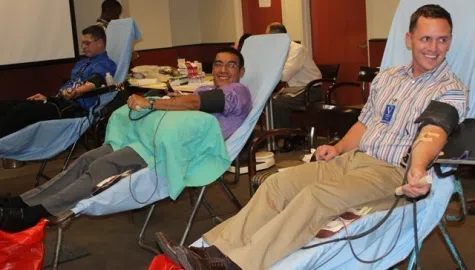(Photo By Flickr User U.S. Mission Uganda)
According to the Center for Disease Control and Prevention & blackamericaweb.com, approximately 25% of people with HIV are also living with hepatitis C.
The combination makes treatment difficult since the medications often don’t agree with each other, worsening one of the viruses as a result. Because hepatitis C could take months to show up in your bloodstream, it’s important to get tested regularly. However, if you’re already been diagnosed with HIV and hepatitis C, liver damage can occur.
But even if you don’t have any diseases, there are foods that can help protect your liver and ultimately help you avoid any further damage. It’s in your best interest to eat a healthy, well-balanced diet that includes the following:
*Fruits and vegetables (especially grapefruit, strawberries, mangos, berries, citrus fruits, watermelon, and dark leafy greens)
*Whole grains (brown rice, barley, buckwheat, quinoa)
*Lean protein (eggs, fish, beans, pork loin, chicken – non-fried)
*Low-fat and non-fat dairy products
*Healthy fats (avocado, nuts, fatty fish – salmon, tuna, mackerel)
*Plenty of water
*Green tea
Avoid greasy, fatty, salty, processed, sugary, raw or undercooked foods, and alcoholic drinks. Although caffeine isn’t recommended, this study shows that drinking three or more cups of coffee a day helped slow down the progression of liver disease.
You should also talk with your doctor about the possibility of adding a multivitamin to your daily routine, but be sure to not overdo it with the iron and vitamins A, B3, C, and D.
Last but not least, getting vaccinated against hepatitis A and B can help prevent further liver damage.




